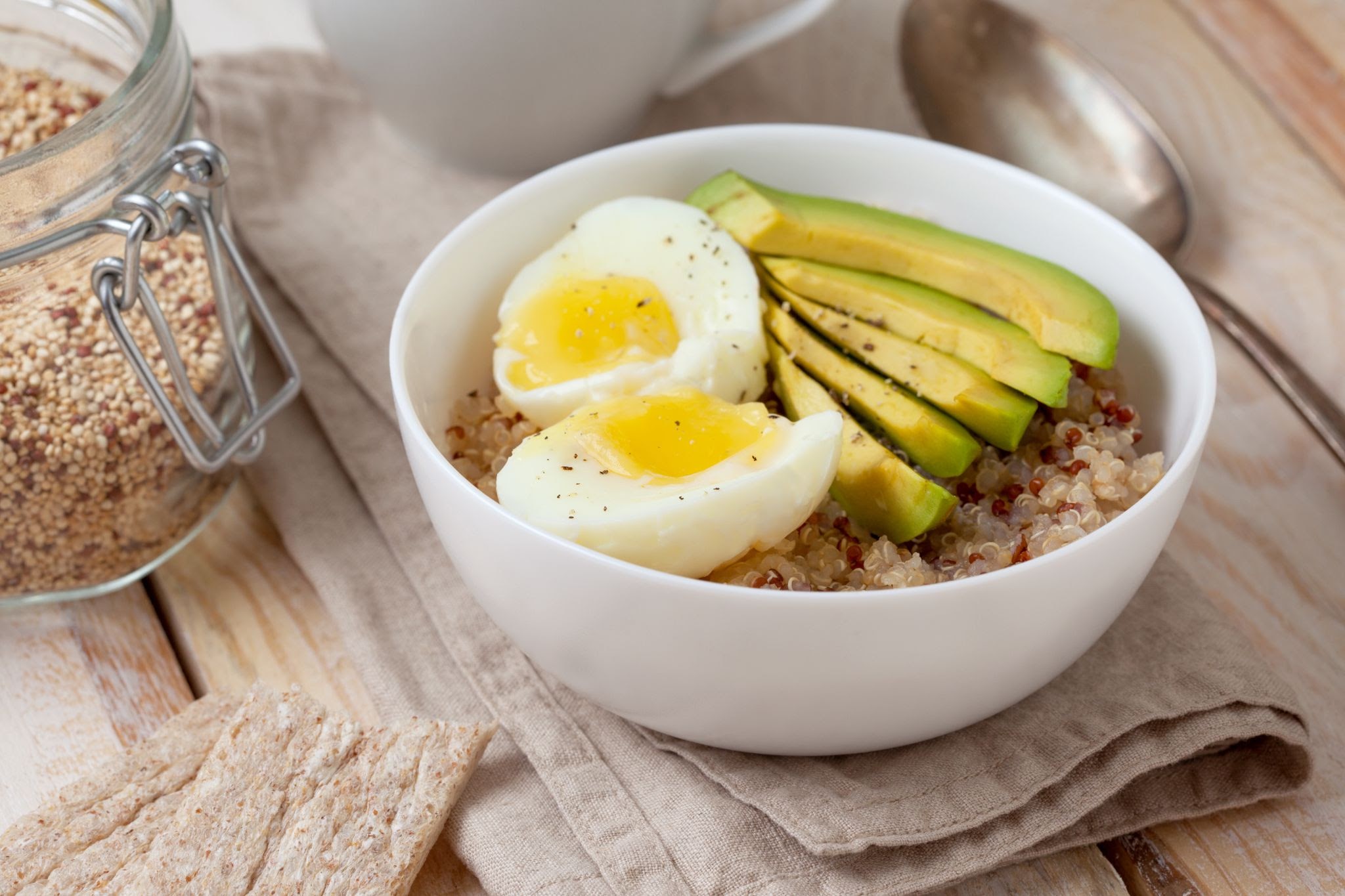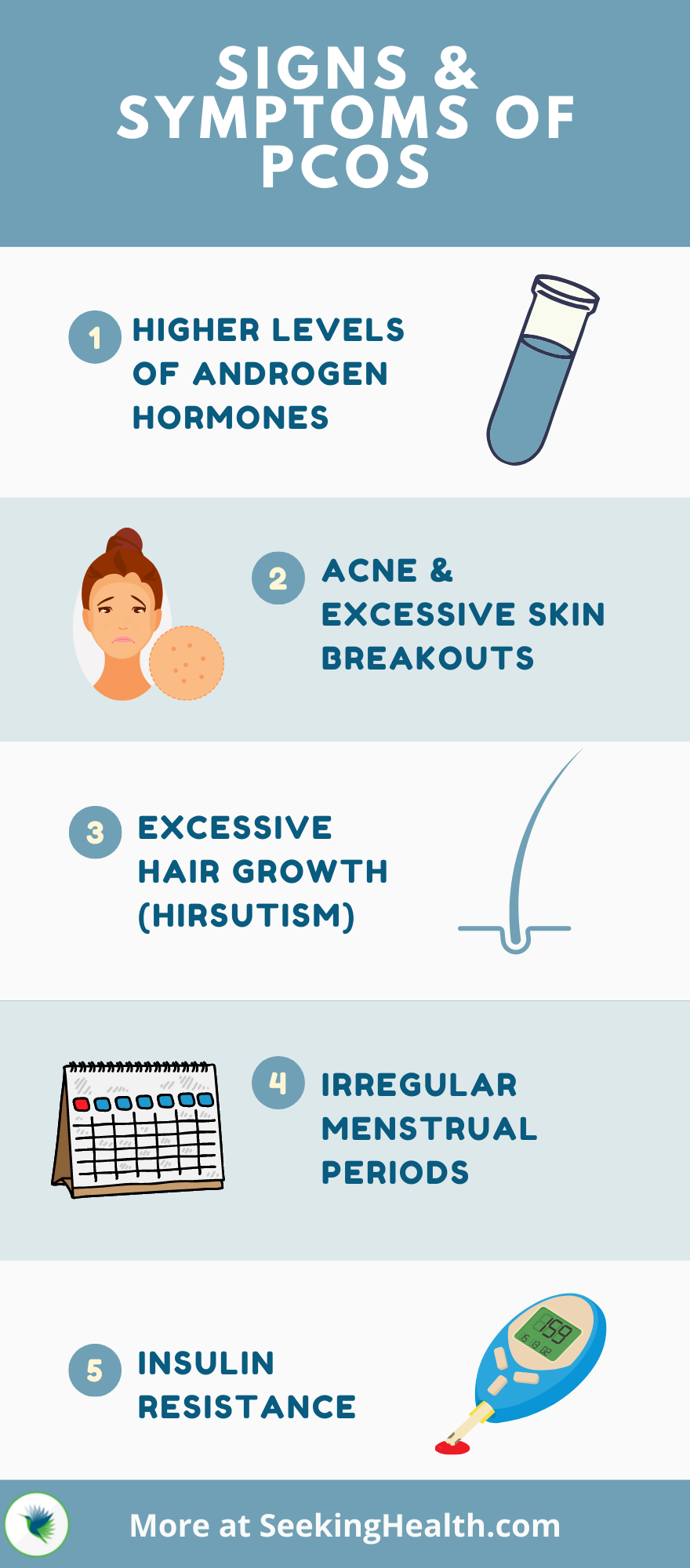Supplements & Lifestyle Support for PCOS

PCOS, or polycystic ovary syndrome, is a female metabolic condition. It was initially named because cysts in the ovaries were found. However, you don’t have to have cysts to be diagnosed with PCOS. The primary symptoms of PCOS are insulin resistance and hormonal imbalance. These can result in problems conceiving, weight gain, acne, and other mood changes.
There are evidence-based ways to support PCOS. You can go on to have a healthy pregnancy even if you have been diagnosed. This article explores PCOS along with proven lifestyle, dietary, and supplement supports.
What is Polycystic Ovary Syndrome (PCOS)?

PCOS is a common reproductive disorder. It affects between 6 and 12 percent of reproductive-age women. (1) PCOS is a condition that is triggered by endocrine (hormone) problems. This results in the ovaries improperly responding to a typical menstrual hormone flow.
PCOS affects 6 to 12% of reproductive-age women in their childbearing years.
Normal cycles involve an egg being released during ovulation, progesterone levels rising, and then a period beginning when the egg isn’t fertilized. After the period begins, follicle stimulating hormone (FSH) and luteinizing hormone (LH) start the process of preparing for ovulation again. Thus the cycle repeats.
If any part of this hormone cascade is interrupted, periods become irregular along with ovulation. That’s what happens with PCOS. The hormones that ripen follicles to release eggs may not be high enough. This results in anovulatory cycles. As a result, progesterone levels don’t increase after ovulation. This can lead to excess levels of estrogen, which can contribute to weight gain and other fertility-related problems. (1)
Sometimes women with PCOS continue to ovulate normally, but hormone levels aren’t high enough. This can result in eggs that are not mature and don’t lead to conception. Any changes to the menstrual cycle can cause problems getting pregnant. (1)
Most women diagnosed with PCOS are either having trouble conceiving or have noticed problems with their period. PCOS often causes periods to be irregular and sometimes quite rare.
The cause of PCOS is not completely understood. Factors that are associated with diagnosis include being overweight or having a family history of PCOS or insulin resistance. (1) Weight alone isn’t a risk factor for PCOS, though. You can be overweight and not have PCOS. You can also be normal weight and have it. Women whose mothers or sisters have PCOS or type 2 diabetes have the highest risk for this hormone-based condition. (1)
PCOS shares many features of metabolic syndrome, including insulin resistance, obesity, and high cholesterol levels.
It’s not known whether PCOS can be prevented. But some treatments include managing insulin resistance through diet and physical activity. Medical professionals also consider these preventive measures, especially if your family risk for PCOS or type 2 diabetes is high.
Signs & Symptoms of PCOS

PCOS can cause ovarian cysts. Cysts are sacs that become filled with fluid, but aren’t associated with releasing mature eggs. After ovulation, the follicle that released the egg typically shrinks. Sometimes a corpus luteum cyst can form where the egg is released, but this is usually a short-lived cyst in only one ovary.
Cysts can develop for many reasons, most of them benign and most not associated with PCOS. (2)
While women with PCOS can have cysts in both ovaries, it’s possible to be diagnosed with PCOS with few or no cysts.
When a healthcare provider is assessing a woman who may have PCOS, there are many layers to consider. Cysts may be one factor. But other signs or symptoms of polycystic ovary syndrome PCOS can include the following.
High levels of androgen hormones
Testosterone is needed in small amounts, but in PCOS, it tends to increase too much. When this happens, the delicate balance between estrogen, progesterone, and testosterone is disrupted. This leads to signaling issues for ovulation and cycle regulation, as well as fertility. If you’re not having regular periods (every 21 to 45 days) or you’re not able to get pregnant, your doctor will likely do hormone blood tests. (3)
Acne
Few expect acne to be a problem after puberty, but it can be a common sign of PCOS. The turbulence between testosterone and estrogen balance can lead to near-constant breakouts on the face or elsewhere. (4)
Hirsutism (excess hair growth)
When testosterone levels get imbalanced, it can lead to excess hair growth in unwanted places. Women with PCOS often notice hair growth on the face, but it can also occur on the abdomen, chest, thighs, and back. (5) Not everyone with PCOS will have excess hair growth. Sometimes hirsutism is caused by other factors even when hormone levels are normal. (6)
Irregular menstrual periods
One of the reasons healthcare providers may look into PCOS is the absence of normal periods. It’s normal for women to have an occasional anovulatory cycle. However, if you don’t know when your period is coming, or if they rarely occur, hormones should be assessed. (Note: this doesn’t apply to women who are on hormonal contraceptives that may affect their normal menstruation.) (7)
Insulin resistance
People assume that insulin problems are limited to diabetes. But insulin resistance can be common to any type of metabolic disorder, including PCOS. Insulin is a hormone that regulates how your body handles glucose. When hormone signaling for insulin gets imbalanced or disrupted, it can be associated with other hormone problems, too. PCOS and type 2 diabetes are closely related, both involving dysfunction with insulin communication and response. (8)
The Medical Approach to PCOS

Doctors don’t use a single lab test to diagnose PCOS. It’s often discovered by piecing together a clinical picture. This can include ultrasounds, lab tests, a physical exam, signs and symptoms, and related factors, like having problems getting pregnant.
There is no one test or treatment for PCOS. While there is no cure, lifestyle and nutrition can be very helpful to alleviate symptoms.
There are also varied ways to treat PCOS. Doctors may have different approaches depending on your health goals. Most of the time, treatment is done to alleviate problematic symptoms. These are often not effective at addressing the underlying cause. For example, sometimes healthcare providers prescribe hormonal contraceptives. This can trick the body into thinking it’s on a “regular” menstrual schedule and may help to address some symptoms. But this does not cure PCOS.
There actually is no cure for this condition. Other than birth control pills, medical treatments for PCOS might include: (9)
- Medication to regulate insulin levels (metformin) and promote weight loss
- Medication to stimulate ovulation (clomiphene) for fertility treatment
- IVF or other advanced reproductive treatments to ripen follicles, mature eggs, and create embryos
- Medication to treat acne
- Medication to slow or reduce excessive hair growth
These medical treatments may be effective at controlling the symptom they’re aimed at, but often come with their own set of side effects. The treatment for one thing may cause new problems. Some PCOS treatments, like for acne, carry a risk for severe birth defects if you get pregnant while you’re on them. (10) It’s easy to assume that you “can’t” get pregnant if you have PCOS, but that’s not true, so it’s important to understand the risks.
Changing Your Lifestyle for PCOS

Women with PCOS have a higher risk for other health problems. Maybe you want to address PCOS to get pregnant or to be rid of problematic symptoms. By having a proactive lifestyle plan, you may also be taking care of other aspects of your health. Women with PCOS have an increased risk of cardiovascular disease, other hormone disorders, and psychological problems. (11)
There are many ways to support your health with PCOS. Nutrition and physical activity are two that should be prioritized.
You can also get benefits from other alternative therapies, lifestyle changes, and supplements.†
PCOS Diet
There isn’t a specific diet to follow for PCOS. Since it’s commonly associated with insulin resistance, meal plans that are supportive of balanced blood glucose (blood sugar) levels are often recommended. These can include:
- Balanced protein intake
- Healthy fats, like omega-3 fatty acids
- Complex carbohydrates with fiber
- Full-fat dairy products (if there’s no allergy or sensitivity)
- Plenty of vegetables
- Lower-starch fruits
- Eggs
- Nuts and seeds
Foods to avoid (or eat in moderation) for insulin balance include:
- Refined sugar and “white” flour
- Highly processed foods, like chips
- Fried foods
- White potatoes
- Alcohol
Ultimately, diets should be individualized to the person, not the medical condition. However, making food changes to promote insulin balance can often lead to weight loss. By eating a food plan that meets your needs on a genetic level, you’ll also support your health in every other way.
Your diet should not be focused on calorie restriction. Instead, you should eat to support your body’s nutritional needs.
When you choose foods that nourish you, instead of restricting foods, you can be in a better position to actually follow through. It’s okay to eat sweets sometimes. You don’t have to follow a “perfect” food plan to be healthy. Real nutrition isn’t about deprivation, but about positive reinforcement. Make sure you’re hitting your nutritional needs and the rest will fall into place.
It’s also important not to forget your gut. Eating nourishing foods is good… but only if your body can digest them and break them down. The absorption of nutrients from the food you eat happens in your gut.
Supporting your gut health is a big part of nutrition.
Gut health isn’t just about popping probiotic supplements. You should eat a variety of complex carbohydrates that have prebiotic fiber (like garlic, onion, leeks, and asparagus). These foods don’t fully digest and make it to your large intestine, where they literally feed the good bacteria that live there. You can also eat fermented foods and take probiotics for more beneficial bacteria. However, some people are sensitive to the histamine that gets produced in response to this. If that happens, you may experience unpleasant digestive symptoms, nausea, or even rashes. If that’s your problem, choose a non-histamine-producing probiotic.
Lifestyle for PCOS

Insulin responds to lifestyle behaviors that tend to have other benefits. Anything that reduces stress tends to also support healthy insulin response. PCOS and insulin resistance can be supported by:
- Regular physical activity. You don’t have to become an elite athlete to get benefits from being active. You don’t even have to love exercise. Walking or finding ways to incorporate more movement into your day can have a big impact. (12) Yoga is also great for PCOS. It can also reduce stress, support balanced hormones, and promote menstrual regularity. (13)
- Healthy sleep. If you’re not getting regular good-quality sleep, it may be contributing to insulin problems. Lack of sleep is also associated with weight gain and decreased fertility. Prioritizing a healthy sleep routine and making sure you get enough shut-eye is important for every part of health. If needed, consider supplemental sleep support.† (14, 15)
- Stress management. Chronic stress is associated with insulin resistance. (16) If you already have PCOS, managing stress in a way that works for you is a crucial part of finding hormone balance. There are many proven ways to lower your stress. Whether you try meditation, therapy, or just improving your physical activity and sleep, it should be a priority.
Best Supplements for PCOS†
Supplements for PCOS aren’t a magic cure-all. Generally, your supplementation should be supportive of your overall health and wellness.
Inositol is a dietary supplement that has specifically been studied for PCOS benefits. Specifically, myo-inositol has been found to improve egg quality and maturation for fertility purposes. (17) It can also improve high blood pressure and other metabolic factors. (18) It can even support healthy body weight for people with PCOS. (19) Inositol can also reduce excess androgen levels and balance triglycerides. (20) It can even be effective for addressing excess body hair and acne. (21) A double-blind trial even found that myo-inositol was effective at improving glucose tolerance and insulin response. (22)
Other supplements can also support your health and fertility. If you have PCOS, especially if you’re trying to conceive, you should consider supplements that support:†
- Fertility, like prenatal vitamins
- Epigenetic health (like MTHFR variants, or others that may be related, like DAO/histamines)
- Digestion and gut health
- Essential nutrients, like magnesium and vitamin D
- Healthy egg maturation, like antioxidants
- Normal inflammation levels, such as fish oil supplements
Supplements shouldn’t be one-size-fits-all. They should be individualized to your personal health needs, just like a nutrition plan. While there are no “PCOS supplements”, there are nutrients that can help to support healthy levels of oxidative stress, inflammation, and insulin sensitivity.†
The Bottom Line
PCOS is a female hormone condition that can result in infertility, irregular periods, and hormone problems. While there’s no cure for it, it’s manageable with lifestyle interventions and nutritional support. If you have PCOS, work with your doctor or nutrition professional to craft a plan that addresses your symptoms and helps you to feel your best.
References
- https://www.cdc.gov/diabetes/basics/pcos.html
- https://www.ncbi.nlm.nih.gov/books/NBK560541/
- https://www.sciencedirect.com/science/article/abs/pii/S0015028208013927
- https://onlinelibrary.wiley.com/doi/abs/10.1111/j.1346-8138.1997.tb02778.x
- https://www.mayoclinic.org/diseases-conditions/hirsutism/symptoms-causes/syc-20354935
- https://www.sciencedirect.com/science/article/abs/pii/S0029784402027254
- https://www.sciencedirect.com/science/article/abs/pii/S0002937803001418
- https://link.springer.com/article/10.1385/ENDO:30:1:13
- https://www.ncbi.nlm.nih.gov/books/NBK278959/
- https://jcadonline.com/oral-spironolactone-in-post-teenage-female-patients-with-acne-vulgaris-practical-considerations-for-the-clinician-based-on-current-data-and-clinical-experience/
- https://www.ncbi.nlm.nih.gov/pmc/articles/PMC4820451/
- https://onlinelibrary.wiley.com/doi/full/10.1111/j.1365-2265.2008.03305.x
- https://www.liebertpub.com/doi/abs/10.1089/acm.2011.0868
- https://www.ncbi.nlm.nih.gov/pmc/articles/PMC3767932/
- https://www.ncbi.nlm.nih.gov/pmc/articles/PMC4402098/
- https://www.ncbi.nlm.nih.gov/pmc/articles/PMC4919480/
- https://pubmed.ncbi.nlm.nih.gov/21608442/
- https://pubmed.ncbi.nlm.nih.gov/22774396/
- https://pubmed.ncbi.nlm.nih.gov/15206484/
- https://pubmed.ncbi.nlm.nih.gov/15251831/
- https://pubmed.ncbi.nlm.nih.gov/19551544/
- https://pubmed.ncbi.nlm.nih.gov/19499845/
†These statements have not been evaluated by the Food and Drug Administration (FDA). This product is not intended to diagnose, treat, cure, or prevent any disease.
‡ This information is for educational purposes only. No product results are implied. This information does not replace the medical advice from your qualified healthcare practitioner.
Topics: Dietary Supplements, Fertility, Lifestyle, Nutrition, PCOS (Polycystic Ovary Syndrome), Preconception, Prenatal, Trying to Conceive (TTC)

